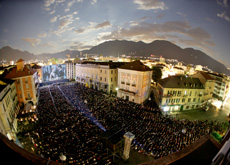
Locarno put squarely on world film map

The 59th Locarno International Film Festival has ended after ten days of ambitious cinema during which it strengthened its reputation as a "place of discoveries".
The weather behaved, the artistic director collapsed, a jury member co-wrote the winning film – it will be a tough act to follow next year.
The festival started in style, if not substance, with Miami Vice – not Miami Vic as some of the foreign news reports had it – although it was a shame not one of the main actors or director Michael Mann turned up.
But you go to Locarno for hidden gems not autographs and Frédéric Maire’s first selection as artistic director placed a greater emphasis than his predecessor Irene Bignardi on new and low-budget work by relatively obscure directors.
“At last they’re showing some good films here…” mumbled laconic Finnish director Aki Kaurismäki, referring to his own Retrospective.
Stamping his mark on the festival, Maire cut the total number of films from around 250 to 170 and scrapped the human rights section, which Bignardi had emphasised.
But the artistic director may have underestimated the demands of his job. He was forced to watch the awards ceremony from his hospital bed, having collapsed on stage in front of 8,000 people on Friday night suffering from exhaustion.
The Piazza Grande, the largest open-air cinema in Europe, hosted not only three Swiss films (and two short films) but also one each from Germany, Austria, Italy and a number of French co-productions.
That paid off in terms of German and French fare – Florian Henckel-Donnersmarck’s Das Leben der Anderen (The Lives of Others) won the public’s prize and French director Isabelle Czajka won the Filmmakers of the Present award for Best First Feature for L’Année Suivante (The Following Year).
Improvement
Less successful however was the world première of Maurizio Sciarra’s Quale Amore (What is love?), a Swiss/Italian co-production shot largely in Lugano and based on Tolstoy’s The Kreutzer Sonata.
The lead actress in this unintentionally funny nonsense was unable to make the festival “due to work reasons” but the thought of being spread naked over almost 400 square metres of screen in front of 8,000 people would make most people think twice.
You can’t win them all however and by and large the feeling is that Maire’s changes have been an improvement.
“I think Locarno took the right decision focusing on the basics – and by that I mean the official competition, the Piazza Grande and the main sections,” Micha Schiwow, head of the national film promotion organisation Swiss Films, told swissinfo.
“Also the reduction in the number of films can only be good for the festival as in the past few years it was often almost impossible to work out what exactly was on offer – there were so many programmes and side-events.”
Different strokes
Although the number of films is down, there’s still something for all tastes. Little Miss Sunshine, a warm, witty satire on US child beauty pageants, hasn’t yet got a release date in Switzerland but is well worth waiting for.
Don’t like funny? Take your pick from genre films such as the British horror-comedy Severance, the extraordinary Thai Western Tears of the Black Tiger or some extreme cinema.
No Body is Perfect, for example, while compelling viewing is certainly not family entertainment. Swiss-French director Raphaël Sibilla’s documentary delves into the world of extreme and unconventional sexual experimentation.
If watching someone who gets their kicks hanging by their skin from hooks isn’t your thing, there’s always West Bank Story, a musical comedy about the unlikely union between an Israeli soldier and a Palestinian worker at a fast-food joint.
The “surprise” final film, which started at 1am on Sunday morning, turned out to be Gus Van Sant’s 1995 black comedy To Die For. Thus two big Hollywood films sandwiched this year’s filling of world discoveries, some considerably more digestible than others.
swissinfo, Thomas Stephens in Locarno
The 59th Locarno Film Festival took place from August 2-12.
21 films were in competition, while 18 films were shown in the Piazza Grande.
Michael Mann’s Miami Vice opened the festival, Gus Van Sant’s To Die For closed it.
Russian director Aleksandr Sokurov received the Leopard of Honour and American actor Willem Dafoe received an award for excellence.
The Locarno International Film Festival was founded in 1946. It is held in August and is attended by around 90,000 visitors and 4,000 professionals.
The main award is the Golden Leopard, won this year by Das Fräulein (The Waitress), a German/Swiss co-production directed by Andrea Staka.

In compliance with the JTI standards
More: SWI swissinfo.ch certified by the Journalism Trust Initiative




























You can find an overview of ongoing debates with our journalists here . Please join us!
If you want to start a conversation about a topic raised in this article or want to report factual errors, email us at english@swissinfo.ch.